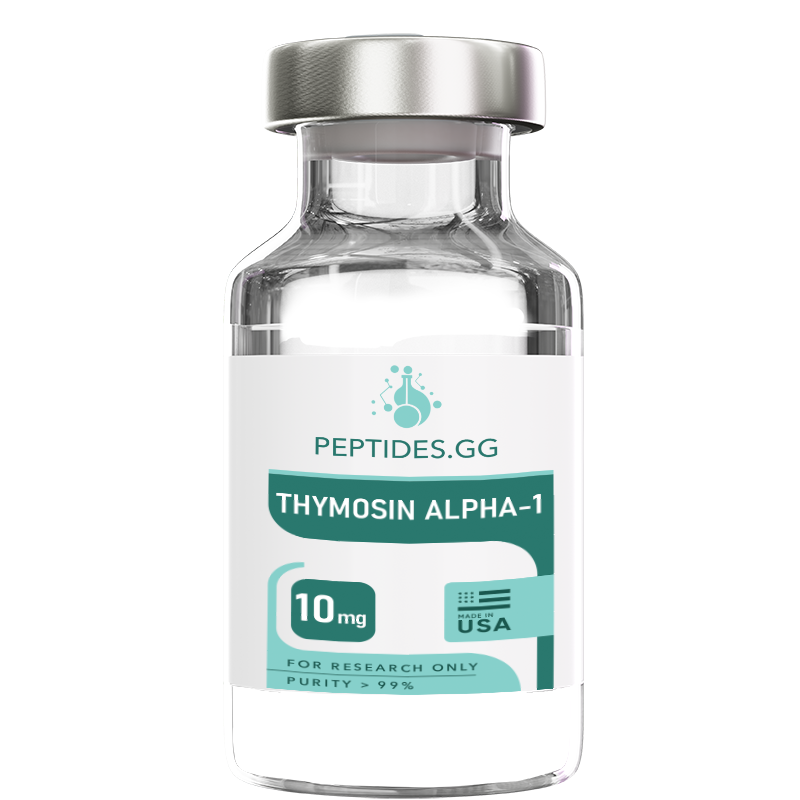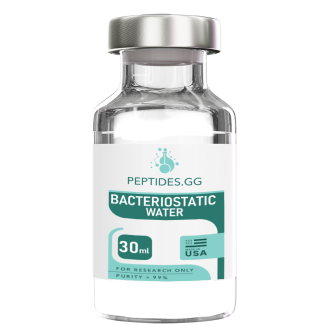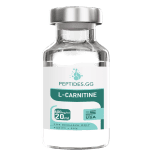Buy Thymosin Alpha-1 peptide for research applications. High-purity Thymosin Alpha-1 research peptide available for laboratory studies and scientific investigation. Shop premium quality research-grade peptides manufactured in the USA with comprehensive Certificate of Analysis documentation.
Important: All products are intended as research chemicals only for laboratory and in vitro testing and experimentation. All product information is educational and not to be taken as medical advice. No products are for human or animal use.
Thymosin Alpha-1
$55.00 – $95.00
- Free Delivery on all orders over $200
- Earn 5% Store Credit with Every Order
- Same Day Shipping Before 1 PM PST
- 10% Discount for Cryptocurrency Payments
14-day money-back guarantee
If you are not satisfied with the product, simply return it and we will refund your money

Buy Thymosin Alpha-1 peptide for research applications. High-purity Thymosin Alpha-1 research peptide available for laboratory studies and scientific investigation. Shop premium quality research-grade peptides manufactured in the USA with comprehensive Certificate of Analysis documentation.
Important: All products are intended as research chemicals only for laboratory and in vitro testing and experimentation. All product information is educational and not to be taken as medical advice. No products are for human or animal use.
Research Overview
Thymosin Alpha-1 serves as a valuable research tool for investigating immune system mechanisms and cellular immunology in laboratory settings. This synthetic peptide represents the biologically active fragment of prothymosin alpha, a protein naturally present in thymus gland tissue where it plays a crucial role in T-cell maturation and immune system development. Research applications have expanded significantly to encompass immunomodulation studies, cytokine signaling investigations, and immune cell function analysis across multiple experimental systems.
The peptide’s designation reflects its origin from thymus tissue, where it was first identified as a thymic hormone-like factor involved in immune system regulation. Laboratory studies investigate Thymosin Alpha-1’s effects on various immune cell populations, including T-cells, natural killer cells, dendritic cells, and macrophages. Research protocols examine these effects in cell culture systems, immune function assays, and preclinical animal models.
Thymosin Alpha-1 research demonstrates the peptide’s ability to modulate multiple aspects of immune function through various signaling pathways. Studies have documented Thymosin Alpha-1’s influence on T-cell differentiation, cytokine production patterns, antigen presentation, and innate immune responses. This broad spectrum of immunological activities makes it valuable for investigating fundamental mechanisms of immune regulation.
Molecular Characteristics
Complete Specifications:
- CAS Registry Number: 62304-98-7
- Molecular Weight: 3,108.3 Da
- Molecular Formula: C₁₂₉H₂₁₅N₃₃O₅₅
- Amino Acid Sequence: Ac-Ser-Asp-Ala-Ala-Val-Asp-Thr-Ser-Ser-Glu-Ile-Thr-Thr-Lys-Asp-Leu-Lys-Glu-Lys-Lys-Glu-Val-Val-Glu-Glu-Ala-Glu-Asn-OH
- Number of Amino Acids: 28
- Peptide Classification: Synthetic immunomodulatory peptide
- N-terminal Modification: Acetylated serine
- Appearance: White to off-white lyophilized powder
- Solubility: Water, bacteriostatic water, phosphate buffered saline
The peptide’s 28-amino acid structure includes an N-terminal acetylation which is critical for biological activity and stability. The sequence contains multiple charged residues including glutamic acid and lysine, creating specific charge distribution patterns that influence receptor interactions and cellular uptake. The peptide lacks cysteine residues, eliminating concerns about disulfide bond formation or oxidation-related degradation.
Pharmacokinetic Profile in Research Models
Thymosin Alpha-1 pharmacokinetic characterization in preclinical research reveals important properties for experimental design:
Absorption and Bioavailability:
- Subcutaneous administration shows high bioavailability in research models
- Rapid absorption from injection site with peak plasma levels at 2-4 hours
- Multiple administration routes investigated: SC, IV, IM
- Good tissue distribution including lymphoid organs
Distribution and Elimination:
- Plasma half-life: Approximately 2-3 hours in rodent models
- Volume of distribution suggests extravascular distribution
- Metabolic clearance primarily through proteolytic degradation
- Accumulation observed in immune-relevant tissues (spleen, lymph nodes, thymus)
These pharmacokinetic characteristics inform research protocol design, particularly regarding dosing schedules and timing of immune response measurements. The moderate half-life allows for sustained biological effects with intermittent dosing in experimental models.
Research Applications
Immunology and Immune Function Studies
Thymosin Alpha-1 serves as a primary research tool for investigating immune system mechanisms. Laboratory studies examine the peptide’s effects on:
- T-Cell Development Research: Investigation of thymic T-cell maturation, positive and negative selection processes, and T-cell receptor expression
- T-Cell Subset Studies: Analysis of CD4+ and CD8+ T-cell differentiation, Th1/Th2 balance, and regulatory T-cell function
- Immune Cell Activation: Examination of lymphocyte activation pathways, proliferation responses, and effector function development
- Cytokine Modulation Research: Studies on cytokine production patterns, including IL-2, IFN-gamma, IL-10, and other immune mediators
- Dendritic Cell Function: Investigation of dendritic cell maturation, antigen presentation, and T-cell priming capacity
Research protocols typically employ immune cell isolation techniques, flow cytometry analysis, cytokine measurements, and functional assays to characterize Thymosin Alpha-1’s effects on immune cell populations and functions.
Innate Immunity Research
Laboratory studies investigate Thymosin Alpha-1’s effects on innate immune system components:
- Natural Killer Cell Studies: Examination of NK cell activity, cytotoxicity, and cytokine production
- Macrophage Research: Investigation of macrophage activation states, phagocytic activity, and inflammatory mediator production
- Pattern Recognition Studies: Analysis of Toll-like receptor (TLR) signaling and innate immune pathway activation
- Antiviral Response Research: Studies examining interferon responses and antiviral defense mechanisms
- Oxidative Response Investigation: Research on reactive oxygen species production and antimicrobial functions
These research areas utilize primary immune cell cultures, reporter assays, and functional assessment methods to characterize innate immune modulation.
Cytokine and Signaling Pathway Research
Thymosin Alpha-1 research extensively investigates cytokine networks and immune signaling:
- Cytokine Expression Studies: Examination of cytokine gene expression, protein production, and secretion patterns
- Signaling Pathway Analysis: Investigation of JAK-STAT, NF-κB, MAPK, and other immune signaling cascades
- Transcription Factor Research: Studies on immune-relevant transcription factors including T-bet, GATA-3, and FoxP3
- Interferon Pathway Investigation: Analysis of Type I and Type II interferon responses and downstream effects
- Growth Factor Studies: Research on immune cell growth factors and survival signals
Laboratory protocols employ molecular biology techniques, luciferase reporter assays, Western blotting, and gene expression analysis to characterize signaling mechanisms.
Immunosenescence and Aging Research
Research applications extend to immune aging investigation:
- Thymic Involution Studies: Examination of age-related thymic changes and T-cell output decline
- Immune Cell Senescence: Investigation of cellular senescence markers in aging immune populations
- Replicative Capacity Research: Studies on immune cell proliferative potential and telomere dynamics
- Immune Function Restoration: Research examining potential restoration of age-declined immune functions
- Inflammaging Investigation: Analysis of age-related chronic low-grade inflammation
Experimental models include aged animal cohorts, senescent cell cultures, and comparative studies between young and aged immune systems.
Vaccine Response and Immunity Research
Thymosin Alpha-1 serves as a research tool for investigating vaccine responses and adaptive immunity:
- Antibody Response Studies: Examination of humoral immune responses, antibody titers, and isotype switching
- Memory Cell Formation: Investigation of immune memory development, long-lived plasma cells, and memory T-cell generation
- Adjuvant Research: Studies examining immunological adjuvant effects and enhanced vaccine responses
- Mucosal Immunity: Research on mucosal immune responses and secretory antibody production
- Immune Priming Studies: Investigation of immune system priming and enhanced response capacity
Research protocols utilize immunization models, ELISA assays, B-cell analysis, and protective immunity assessment.
Antiviral and Antimicrobial Research
Laboratory studies investigate immunological aspects of host defense:
- Antiviral Immunity Studies: Examination of immune responses against viral pathogens in experimental models
- Interferon Response Research: Investigation of interferon-mediated antiviral defense mechanisms
- Cellular Immunity Analysis: Studies on cytotoxic T-cell responses and viral clearance
- Antibacterial Response: Research on immune responses to bacterial challenges
- Fungal Immunity Studies: Investigation of antifungal immune mechanisms
These research applications employ pathogen challenge models, immune response quantification, and protective immunity assessment.
Laboratory Handling and Storage Protocols
Lyophilized Powder Storage:
- Store at -20°C to -80°C in original sealed vial
- Protect from light exposure and moisture
- Desiccated storage environment required
- Stability data available for 12+ months at -20°C
- Long-term storage at -80°C recommended for extended periods
Reconstitution Guidelines:
- Reconstitute with sterile water, bacteriostatic water (0.9% benzyl alcohol), or phosphate buffered saline
- Add solvent slowly down vial side to minimize foaming
- Gentle swirling motion recommended (avoid vigorous shaking)
- Allow complete dissolution before use (typically 2-5 minutes)
- Final pH should be 6.5-7.5 for optimal stability
- Typical reconstitution: 5mg vial with 1-2mL solvent yields 2.5-5mg/mL solution
Reconstituted Solution Storage:
- Short-term storage: 4°C for up to 7 days
- Long-term storage: -20°C in aliquots to avoid freeze-thaw cycles
- Single-use aliquots strongly recommended to maintain peptide integrity
- Avoid repeated freeze-thaw cycles (maximum 2-3 cycles)
- Mark aliquots with date of reconstitution
Stability Considerations:
Thymosin Alpha-1 demonstrates good stability when properly stored. The N-terminal acetylation provides protection against aminopeptidase degradation. However, like all peptides, it is subject to oxidation and hydrolysis under harsh conditions. Maintain sterile technique during reconstitution to prevent bacterial contamination.
Quality Assurance and Analytical Testing
Each Thymosin Alpha-1 batch undergoes comprehensive analytical characterization:
Purity Analysis:
- High-Performance Liquid Chromatography (HPLC): ≥98% purity
- Analytical method: Reversed-phase HPLC with UV detection at 214nm and 280nm
- Multiple peak integration to ensure accurate purity determination
- Related substances and degradation products quantified
Structural Verification:
- Electrospray Ionization Mass Spectrometry (ESI-MS): Confirms molecular weight 3,108.3 Da
- MALDI-TOF mass spectrometry: Additional structural confirmation
- Amino acid analysis: Verifies sequence composition
- Peptide content determination: Quantifies actual peptide content by weight
- N-terminal acetylation confirmed
Contaminant Testing:
- Bacterial endotoxin: <5 EU/mg (LAL method, USP )
- Heavy metals: Below detection limits per USP and
- Residual solvents: TFA and acetonitrile within ICH Q3C limits
- Water content: Karl Fischer titration (<8%)
- Bioburden testing: Sterility confirmation
Documentation:
- Certificate of Analysis (COA) provided with each batch
- Third-party analytical verification available upon request
- Stability data documented for recommended storage conditions
- Batch-specific QC results traceable by lot number
- Chain of custody documentation available
Research Considerations
Experimental Design Factors:
Researchers should consider several factors when designing Thymosin Alpha-1 experiments:
1. Concentration Selection: Published research utilizes wide concentration ranges (0.1-100 μg/mL in vitro, 0.1-10 mg/kg in vivo). Dose-response studies recommended for new experimental systems.
2. Temporal Considerations: Immune responses require time to develop. Typical experimental timelines range from 24 hours (cytokine responses) to several weeks (memory cell formation).
3. Route Considerations: Subcutaneous administration most commonly used in preclinical research. In vitro studies add peptide directly to culture medium.
4. Model Selection: Choose appropriate immune cell types, co-culture systems, or animal models based on specific research questions.
5. Control Groups: Include vehicle controls, unstimulated controls, and positive controls (e.g., known immune stimulants like ConA or LPS).
6. Immune Cell Source: Consider using primary cells vs. cell lines, as responsiveness may differ.
Mechanism Investigation:
Thymosin Alpha-1’s mechanisms of action involve multiple pathways:
- TLR9 signaling activation
- Interferon regulatory factor (IRF) activation
- STAT3 and STAT5 phosphorylation
- NF-κB pathway modulation
- CD28-mediated costimulation enhancement
- IL-2/IL-2R pathway potentiation
The peptide’s multiple mechanisms require careful experimental design to isolate specific effects. Use of pathway-specific inhibitors, knockout cell lines, or neutralizing antibodies can help dissect individual contributions.
Compliance and Safety Information
Regulatory Status:
Thymosin Alpha-1 is provided as a research chemical for in-vitro laboratory studies and preclinical research only. This product has not been approved by the FDA for human therapeutic use, dietary supplementation, or medical applications. While thymosin alpha-1 formulations are approved in some countries for specific medical indications, this research-grade material is not intended for such purposes.
Intended Use:
- In-vitro immune cell studies
- In-vivo preclinical immunology research in approved animal models
- Laboratory investigation of immunological mechanisms
- Academic and institutional research applications
- Biochemical and molecular biology studies
NOT Intended For:
- Human consumption or administration
- Therapeutic treatment or diagnosis
- Dietary supplementation
- Veterinary therapeutic applications without appropriate oversight
- Any clinical or medical applications
Safety Protocols:
Researchers should follow standard laboratory safety practices when handling Thymosin Alpha-1:
- Use appropriate personal protective equipment (lab coat, gloves, safety glasses)
- Handle in well-ventilated areas or biological safety cabinet when appropriate
- Follow institutional biosafety guidelines and immunological research protocols
- Dispose of waste according to local regulations for biological/chemical waste
- Consult material safety data sheet (MSDS) for additional safety information
- Follow institutional biosafety committee (IBC) approved protocols
—
 25% OFF $400+ • 35% OFF $800+ ALL WEEKEND
25% OFF $400+ • 35% OFF $800+ ALL WEEKEND 



